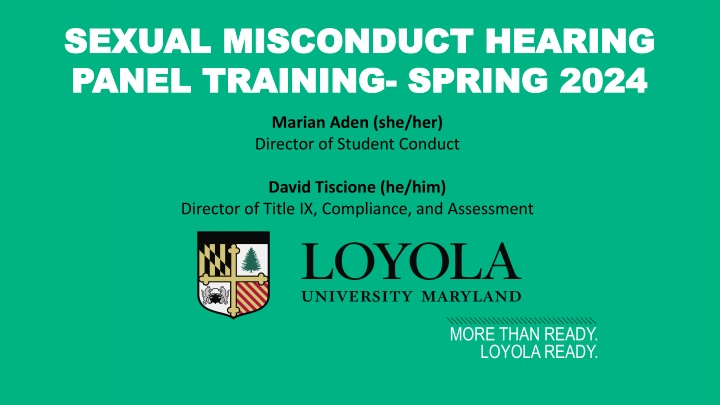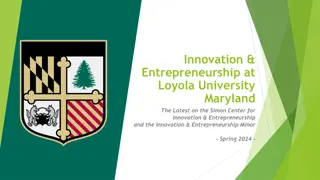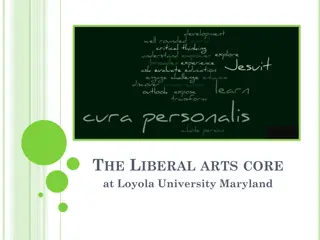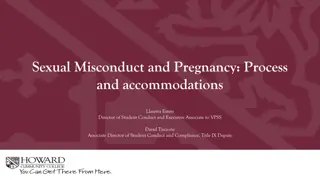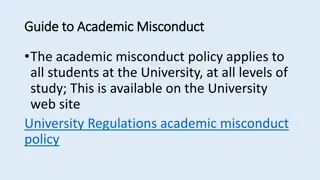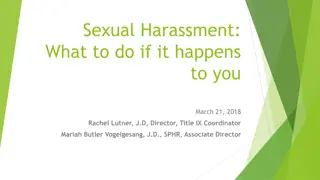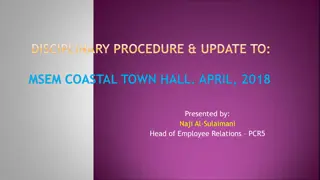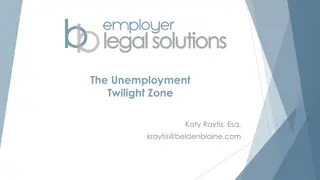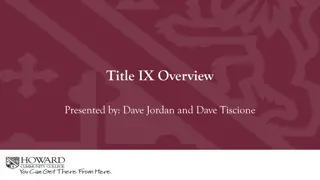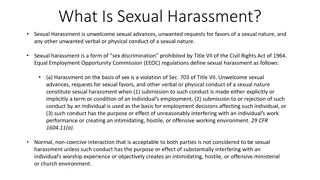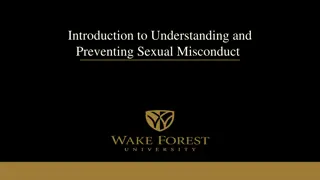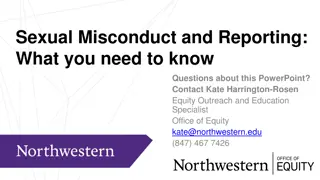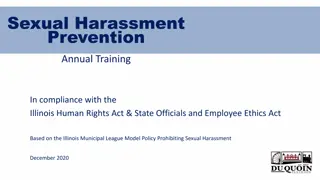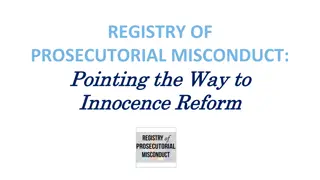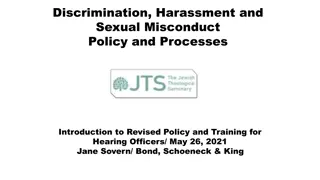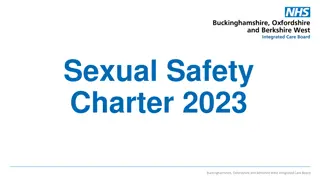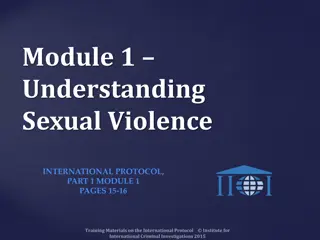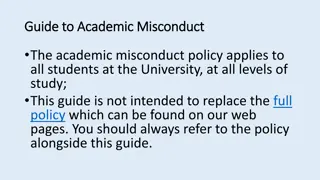Loyola University Maryland Sexual Misconduct Policy Updates and Training Overview
Loyola University Maryland provides comprehensive training on sexual misconduct policies and processes, including updates on definitions such as sexual assault, fondling, and incest. The training covers information on sanctions, case studies, and policy reminders, emphasizing the importance of addressing sexual harassment in all its forms.
Download Presentation

Please find below an Image/Link to download the presentation.
The content on the website is provided AS IS for your information and personal use only. It may not be sold, licensed, or shared on other websites without obtaining consent from the author.If you encounter any issues during the download, it is possible that the publisher has removed the file from their server.
You are allowed to download the files provided on this website for personal or commercial use, subject to the condition that they are used lawfully. All files are the property of their respective owners.
The content on the website is provided AS IS for your information and personal use only. It may not be sold, licensed, or shared on other websites without obtaining consent from the author.
E N D
Presentation Transcript
SEXUAL MISCONDUCT HEARING SEXUAL MISCONDUCT HEARING PANEL TRAINING PANEL TRAINING- - SPRING 2024 SPRING 2024 Marian Aden (she/her) Director of Student Conduct David Tiscione (he/him) Director of Title IX, Compliance, and Assessment MORE THAN READY. MORE THAN READY. LOYOLA READY. LOYOLA READY. Loyola University Maryland Internal Use Only
OVERVIEW OF TRAINING OVERVIEW OF TRAINING Policy update Policy and Process Reminders Update on Regs Timeline Sanctioning Guide Case Study Loyola University Maryland Internal Use Only
POLICY UPDATES POLICY UPDATES Sexual assault is defined as any sexual act directed against another person, without consent of the complainant, including instances where the complainant is incapable of giving consent. Sexual assault includes penetration, no matter how slight, of the vagina or anus with any body part or object, or oral penetration by a sex organ of another person, without the consent of the complainant. This definition includes any gender of the complainant or respondent. Fondling is another form of sexual assault which is defined as the touching of the private body parts, including but not limited to breasts, buttocks, or groin of another person, for the purpose of sexual gratification, without the consent of the complainant, including instances where the complainant is incapable of giving consent because of their age or because of their temporary or permanent mental incapacity. (This would include someone (person A) making another person (person B) touch their (person A) private body parts sexually without their (person B) consent.) Loyola University Maryland Internal Use Only
POLICY UPDATES POLICY UPDATES Incest is also a form of sexual assault when defined as non-forcible sexual intercourse occurs between persons who are related to each other within the degrees wherein marriage is prohibited by law. Added the following sanction: 29. Removal from Employment- A student found responsible for a Sexual and Gender-Based Misconduct policy may be removed from their on-campus employment, if appropriate. Loyola University Maryland Internal Use Only
POLICY REVIEW POLICY REVIEW Sexual Harassment defined as conduct on the basis of sex which may include such behavior as unwelcome sexual advances, requests, and other verbal, written, or electronic communications or physical conduct of a sexual nature when (1) an employee of the University conditions the provision of an aid, benefit, or service of the University on an individual s participation in the unwelcome sexual conduct; or (2) unwelcome conduct determined by a reasonable person to be so severe, pervasive, and objectively offensive that it effectively denies a person equal access to the University s education program or activity. Loyola University Maryland Internal Use Only
POLICY REVIEW POLICY REVIEW Fondling is defined as the touching of the private body parts, including but not limited to breasts, buttocks, or groin of another person, for the purpose of sexual gratification, without the consent of the complainant, including instances where the complainant is incapable of giving consent because of their age or because of their temporary or permanent mental incapacity. This would include someone (person A) making another person (person B) touch their (person A) private body parts sexually without their (person B) consent. Loyola University Maryland Internal Use Only
POLICY REVIEW POLICY REVIEW Statutory Rape is defined as non-forcible sexual intercourse with a person who is under the statutory age of consent which is 16 years of age in the state of Maryland (which means the victim must be under 16); however, 14- and 15-year-olds may consent if the offender is less than four years older than the victim. Loyola University Maryland Internal Use Only
POLICY REVIEW POLICY REVIEW Dating Violence encompasses a wide range of behaviors including sexual assault, physical abuse and other forms of violence committed by a person who is or has been in a social relationship of a romantic or intimate nature with the complainant. The existence of such a relationship shall be determined based on the complainant s statement and with consideration of the length of the relationship, the type of relationship, and the frequency of interaction between the persons involved in the relationship. For the purposes of this definition, dating violence includes, but is not limited to, sexual or physical abuse or the threat of such abuse. Dating violence does not include acts covered under the definition of domestic violence. Loyola University Maryland Internal Use Only
POLICY REVIEW POLICY REVIEW Domestic Violence encompasses a wide range of behaviors including sexual assault, physical abuse and other forms of violence committed by a current or former spouse or intimate partner of the complainant; by a person with whom the complainant shares a child in common; by a person who is cohabitating with or has cohabitated with, the complainant as a spouse or intimate partner; by a person similarly situated to a spouse of the complainant, or by any other person against an adult or youth complainant protected from those acts by domestic or family violence laws of Maryland. Loyola University Maryland Internal Use Only
POLICY REVIEW POLICY REVIEW Violence under dating violence and domestic violence includes but is not limited to: the use or attempted use of physical abuse or sexual abuse a pattern of any other coercive behavior committed, enabled, or solicited to gain or maintain power and control over a victim including verbal, psychological, economic, or technological abuse. Economic abuse means behavior that is coercive, deceptive, or unreasonably controls or restrains a person s ability to acquire, use, or maintain economic resources to which they are entitled, including using coercion, fraud, or manipulation to restrict a person s access to money, assets, credit, or financial information; unfairly use a person s personal economic resources, including money, assets, and credit, for one s own advantage; or exert undue influence over a person s financial and economic behavior or decisions, including forcing default on joint or other financial obligations, exploiting powers of attorney, guardianship, or conservatorship, or failing or neglecting to act in the best interests of a person to whom one has a fiduciary duty. Technological Abuse means an act or pattern of behavior that is intended to harm, threaten, intimidate, control, stalk, harass, impersonate, exploit, extort, or monitor, except as otherwise permitted by law, another person, that occurs using any form of technology, including but not limited to: internet enabled devices, online spaces and platforms, computers, mobile devices, cameras and imaging programs, apps, location tracking devices, or communication technologies, or any other emerging technologies. Loyola University Maryland Internal Use Only
POLICY REVIEW POLICY REVIEW Economic abuse means behavior that is coercive, deceptive, or unreasonably controls or restrains a person s ability to acquire, use, or maintain economic resources to which they are entitled, including using coercion, fraud, or manipulation to restrict a person s access to money, assets, credit, or financial information; unfairly use a person s personal economic resources, including money, assets, and credit, for one s own advantage; or exert undue influence over a person s financial and economic behavior or decisions, including forcing default on joint or other financial obligations, exploiting powers of attorney, guardianship, or conservatorship, or failing or neglecting to act in the best interests of a person to whom one has a fiduciary duty. Technological Abuse means an act or pattern of behavior that is intended to harm, threaten, intimidate, control, stalk, harass, impersonate, exploit, extort, or monitor, except as otherwise permitted by law, another person, that occurs using any form of technology, including but not limited to: internet enabled devices, online spaces and platforms, computers, mobile devices, cameras and imaging programs, apps, location tracking devices, or communication technologies, or any other emerging technologies. Loyola University Maryland Internal Use Only
POLICY REVIEW POLICY REVIEW Stalking is defined as engaging in a course of conduct directed at a specific person that would cause a reasonable person to fear for the person s safety or the safety of others or suffer substantial emotional distress. A course of conduct means two or more acts, including, but not limited to, acts in which the stalker directly, indirectly, or through third parties, by any action, method, device, or means, follows, monitors, observes, surveils, threatens, or communicates to or about a person, or interferes with a person s property. A reasonable person means a reasonable person under similar circumstances and with similar identities to the complainant. Substantial emotional distress means significant mental suffering or anguish that may but does not necessarily require medical or other professional treatment or counseling. Loyola University Maryland Internal Use Only
POLICY REVIEW (NON TITLE IX) POLICY REVIEW (NON TITLE IX) Harassment under this section means unwelcome verbal, written or physical conduct based on sex, sexual orientation and/or gender identity, that has the purpose or effect of unreasonably interfering with an individual's work or education (including living conditions) or that creates an intimidating, hostile or offensive environment. Student Quid Pro Quo Sexual harassment is a form of harassment that consists of unwelcome sexual advances, requests for sexual favors, or other verbal, written, or physical conduct of a sexual nature when a student of the University conditions the provision of an aid, benefit, or service of the University on an individual s participation in the unwelcome sexual conduct. Loyola University Maryland Internal Use Only
POLICY REVIEW (NON TITLE IX) POLICY REVIEW (NON TITLE IX) Sexual exploitation means taking non-consensual or abusive sexual advantage of another person for one s own advantage or benefit or for the advantage or benefit of anyone other than the person being exploited. Examples include but are not limited to non-consensual photography, video-, or audio- recording of sexual images or activity, distributing images of sexual activity without consent, allowing others to observe a consensual sexual act without the prior knowledge or consent of all involved parties, and voyeurism. Loyola University Maryland Internal Use Only
UPDATE ON REGS TIMELINE UPDATE ON REGS TIMELINE Have been delayed multiple times Will likely be released by July with implementation in August Training in August Loyola University Maryland Internal Use Only
ATIXA ATIXA SANCTION GUIDE SANCTION GUIDE Loyola University Maryland Internal Use Only
THINGS TO CONSIDER THINGS TO CONSIDER Mitigating, Aggravating, and Compounding Factors Severity and Egregiousness Cumulative Violations Prior Conduct History Precedent Complainant request/ Respondent acceptance of responsibility Loyola University Maryland Internal Use Only
SEXUAL HARASSMENT (SPOO) SEXUAL HARASSMENT (SPOO)- - GUIDE GUIDE Loyola University Maryland Internal Use Only
SEXUAL ASSAULT SEXUAL ASSAULT- - GUIDE GUIDE Loyola University Maryland Internal Use Only
FONDLING FONDLING- - GUIDE GUIDE Loyola University Maryland Internal Use Only
DATING & DOMESTIC VIOLENCE DATING & DOMESTIC VIOLENCE- - GUIDE GUIDE Loyola University Maryland Internal Use Only
STALKING STALKING- - GUIDE GUIDE Loyola University Maryland Internal Use Only
INCAPACITATION INCAPACITATION Loyola University Maryland Internal Use Only
INCAPACITATION REVIEW INCAPACITATION REVIEW Incapacitation is a state where someone cannot make rational, reasonable decisions because they lack the capacity to give knowing consent (e.g., to understand the who, what, when, where, why or how of their sexual interaction). While incapacitation may result from the use of alcohol and/or drugs, incapacitation is a state beyond drunkenness or intoxication. Incapacitation may also exist because of a physical, mental, or developmental disability. The question of incapacitation will be examined objectively from the perspective of the respondent i.e., whether a reasonable, sober person in place of the respondent should have known the condition of the complainant based on the apparent indications of incapacitation, which may include, but are not limited to, acting confused or incoherent, difficulty walking or speaking, and vomiting. Loyola University Maryland Internal Use Only
JALEN AND JALEN AND YAMEEKA STUDY STUDY YAMEEKA- - CASE CASE Loyola University Maryland Internal Use Only
WHAT ARE STATEMENTS OR ACTIONS WHAT ARE STATEMENTS OR ACTIONS THAT COULD INDICATE THAT COULD INDICATE INCAPACITATION? INCAPACITATION? Loyola University Maryland Internal Use Only
WHERE CAN EVIDENCE OF WHERE CAN EVIDENCE OF INCAPACITATION COME FROM? INCAPACITATION COME FROM? Loyola University Maryland Internal Use Only
WHAT QUESTIONS WOULD YOU ASK TO WHAT QUESTIONS WOULD YOU ASK TO ASSESS INCAPACITATION? ASSESS INCAPACITATION? Loyola University Maryland Internal Use Only
QUESTIONS QUESTIONS Loyola University Maryland Internal Use Only
